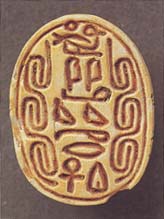Image Details

Israel Antiquities Authority
What relevance does this scarab have to the Biblical account of the patriarch Jacob? Very little, according to William Dever. While the patriarchal names in the Hebrew Bible may date to the Middle Bronze Age (c. 2000–1500 B.C.), it doesn’t prove that the Biblical Jacob lived during that time. Others disagree. British Egyptologist and Bible scholar Kenneth Kitchen has argued that Jacob and similar names (technically called Amorite imperfectives) are common in extra-Biblical Near Eastern sources from the early second millennium B.C. but increasingly rare thereafter. Kitchen takes this as one indicator that the patriarchal stories date to about 2000 to 1750 B.C. and not to more than a thousand years later, as some scholars claim.
